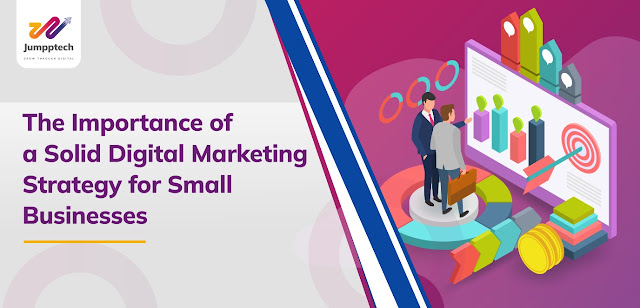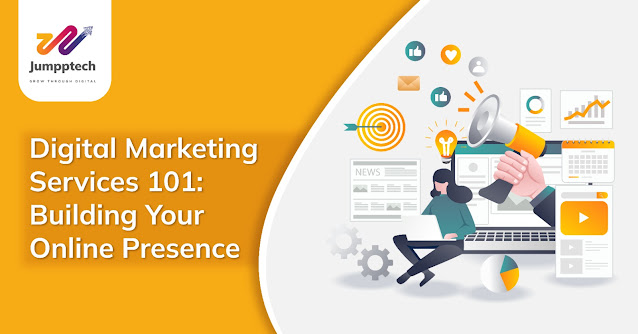The Importance of a Solid Digital Marketing Strategy for Small Businesses
The importance of a solid digital marketing strategy for small businesses cannot be overstated. In today's digital age, small businesses are facing more competition than ever before, and an effective digital marketing strategy can give them the edge they need to stand out. Without a well-crafted plan, small businesses may struggle to reach their target audience, generate leads, and drive conversions. In this article, we will explore the challenges small businesses face in the digital landscape, the benefits of a solid digital marketing strategy, and the key elements of a successful plan. We will also provide tips and best practices for small businesses to develop and implement a comprehensive digital marketing strategy that will help them achieve their business goals.
The challenges small businesses face in the digital landscape:
Small businesses often face a number of difficulties when
trying to establish a strong online presence in the digital world. One of the
biggest challenges is limited resources, both in terms of time and money. Small
businesses often have a smaller budget and a smaller team, which can make it
difficult to compete with larger companies that have more resources to devote
to their digital marketing efforts.
Another challenge small businesses face is competition from
larger companies. These companies often have a larger customer base and more
brand recognition, which can make it difficult for small businesses to get
noticed. Additionally, larger companies may have more resources to invest in
digital marketing efforts such as pay-per-click (PPC) advertising, social media
campaigns, and search engine optimization (SEO).
Another difficulty small businesses may face is the lack of
knowledge and expertise, which can make it challenging for them to navigate the
ever-changing digital landscape. They may not be aware of the latest trends,
technologies, and best practices, which can make it difficult for them to
create an effective digital marketing strategy.
Moreover, small businesses may also face the challenge of
building trust and credibility online, as they may not have the same level of
brand recognition as larger companies. This can make it difficult to attract
and retain customers.
All these challenges can make it difficult for small
businesses to establish a strong online presence, generate leads, and drive
conversions. However, with the right digital marketing strategy in place, small
businesses can overcome these obstacles and achieve their business goals.
The benefits of a solid digital marketing strategy:
A well-crafted digital marketing strategy can bring a number of advantages to a small business, including:
·
Increased
Visibility: A comprehensive digital marketing strategy can help small
businesses increase their online visibility and reach a wider audience. By
using a combination of SEO, PPC advertising, and social media marketing, small
businesses can increase their search engine rankings, reach more potential customers,
and build a larger online following.
·
Higher
Engagement: A solid digital marketing strategy can also help small
businesses increase engagement with their target audience. By creating and
sharing relevant and valuable content, small businesses can attract and retain
customers, build trust, and establish themselves as credible source of
information in their industry.
·
Stronger
Customer Relationships: Digital marketing strategies can also help small
businesses to develop stronger relationships with their customers. By using
tactics such as email marketing, social media marketing, and Chabot, small businesses can
communicate with their customers directly and provide personalized experiences,
which can lead to increased customer loyalty and repeat business.
·
Cost-effective:
A well-crafted digital marketing strategy can also be cost-effective for small
businesses. Unlike traditional marketing methods, many digital marketing
tactics are low-cost or even free to implement, making them a great option for
small businesses with limited budgets.
·
Measurable:
Digital marketing strategies are easy to track, measure, and analyze, which
helps small businesses to see the impact of their marketing efforts. This
allows small business owners to make data-driven decisions, optimize their
strategies and get better results.
By taking advantage of the benefits of a comprehensive
digital marketing strategy, small businesses can level the playing field with
larger companies and achieve their business goals.
Developing a digital marketing strategy:
Developing a digital marketing strategy involves several key
steps:
1.
Setting
Goals: The first step in developing a digital marketing strategy is to
establish clear and measurable goals. Small businesses should identify what
they want to achieve with their digital marketing efforts, such as increasing
website traffic, generating leads, or boosting sales.
2.
Identifying
Target Audience: The next step is to identify the target audience. Small
businesses should research and understand their target audience's demographics,
interests, and pain points, and use this information to create tailored content
and campaigns that will resonate with them.
3.
Selecting
the Right Channels: Once the target audience has been identified, small
businesses should choose the right channels to reach them. This might include
social media platforms, email marketing, PPC advertising, or SEO.
4.
Creating
a Content Strategy: A content strategy is a plan for creating and
distributing valuable and relevant content that aligns with the business's
goals and target audience. Small businesses should create a content calendar
that outlines what types of content will be created and when, and how it will
be promoted.
5. Measuring and Optimizing: The final step in developing a digital marketing strategy is to measure and optimize the results. Small businesses should track their digital marketing efforts using analytics tools such as Google Analytics, and regularly evaluate their performance. Based on the results, small businesses can make adjustments to their strategy to improve their results.
It's important to keep in mind that a digital marketing
strategy is not a one-time process, it's an ongoing effort that requires
constant monitoring, adjusting, and optimizing to achieve the desired results.
Developing a digital marketing strategy:
A comprehensive digital marketing strategy typically
includes the following key elements:
Setting Goals:
The first step in developing a digital marketing strategy is to establish clear
and measurable goals. These goals should align with the overall business
objectives and may include increasing website traffic, generating leads,
boosting sales, or building brand awareness.
Identifying Target
Audience: Understanding the target audience is crucial in developing a
digital marketing strategy. This includes research on demographics, interests,
pain points, and behavior patterns. This information can be used to create
tailored content and campaigns that will resonate with the target audience.
Selecting the Right
Channels: Once the target audience is identified, the next step is to
select the channels that will be used to reach them. This may include social
media platforms, email marketing, PPC advertising, SEO, or a combination of
different channels.
Developing a Content
Strategy: A content strategy outlines what types of content will be
created when it will be created, and how it will be promoted. The content
should be relevant, valuable, and aligned with the business's goals and target
audience.
Optimizing for Search
Engines: Search Engine Optimization (SEO) is the process of optimizing the
website and its content to increase the website's visibility in search engine
results. This includes researching keywords, creating valuable content, and
technical optimization.
Creating Paid
Advertising Campaigns: Paid advertising campaigns, such as Google AdWords
or Facebook ads, can be used to reach a larger audience and drive more targeted
traffic to the website.
Using Social Media
Platforms: Social media platforms can be used to interact with customers,
build brand awareness, and drive traffic to the website.
Email Marketing: Email marketing services
is a cost-effective way to reach customers, promote products and services, and
build relationships.
Measuring and
Analyzing: Measuring and analyzing the results of digital marketing efforts
is crucial to optimize and improving the overall strategy. This includes tracking
website traffic, conversions, and engagement, as well as analyzing data from
paid advertising and social media campaigns.
All these elements are interrelated and should be considered
and implemented together to build a comprehensive digital marketing strategy.
Implementing and measuring success:
Tracking and measuring the success of a digital marketing strategy is essential for small businesses to understand the impact of their efforts and make data-driven decisions. By regularly monitoring and analyzing key performance indicators (KPIs), small businesses can identify areas that are working well, as well as areas that need improvement.
Some of the key metrics that small businesses should track
and measure include:
Website Traffic:
This includes the number of visitors to the website, the sources of traffic
(such as search engines, social media, or referral websites), and the pages
that are most frequently visited.
Conversion Rates:
This includes the percentage of website visitors who take a desired action,
such as filling out a contact form, making a purchase, or signing up for a
newsletter.
Engagement: This
includes metrics such as likes, shares, comments, and click-through rates on
social media and email marketing campaigns.
Return on Investment
(ROI): This measures the profitability of a digital marketing campaign by
calculating the revenue generated divided by the cost of the campaign.
Brand Awareness:
This includes metrics such as website traffic, social media followers, and
mentions of the brand in the media.
By tracking and measuring these metrics, small businesses
can identify which digital marketing efforts are most effective and make
data-driven decisions to optimize and improve their strategies. Additionally,
they can also identify the pain points of their customers, which can help them
to improve their products and services.
It's important to note that tracking and measuring the
success of a digital marketing strategy is an ongoing process that should be
integrated into the overall strategy. It will help small business owners to
make informed decisions, and adjust their strategies accordingly to achieve their
goals.
Conclusion:
Investing in developing and implementing a comprehensive
digital marketing strategy is essential for small businesses to establish a
strong online presence, reach their target audience, and achieve their business
goals. A well-crafted digital marketing strategy can help small businesses
increase their online visibility, generate leads, drive conversions, and build
stronger relationships with their customers.
Small businesses should understand that a comprehensive
digital marketing strategy is not a one-time process, but an ongoing effort
that requires constant monitoring, adjusting, and optimizing to achieve the
desired results. It's an investment that will bring long-term benefits to
their business.
In addition, small businesses should also consider working
with a professional digital marketing agency that can provide the expertise,
resources, and guidance to help them create and execute a successful digital
marketing strategy. A professional agency can help small businesses navigate
the ever-changing digital landscape, stay ahead of the competition and achieve
their goals.




Comments
Post a Comment